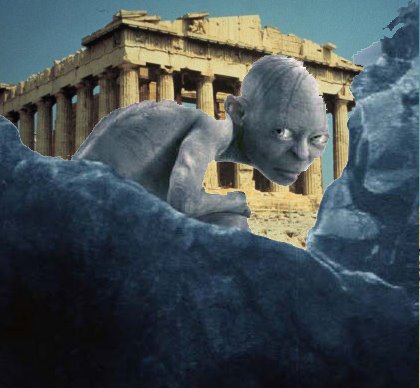07.10.06 - It's the Enthymeme World, as We Know It
In what ways do you think Jesse Jackson's speech makes use of topoi and concepts from Aristotle's Rhetoric? What are the key differences between Aris and Plastico? Which are you--Aristotelian or Platonic--in your teaching and/or work?
Jesse Jackson’s 1988 speech is filled with uses of rhetorical concepts. For example, he uses an enthymeme in his statement, “Young America, hold your head high now. We can win. We must not lose you to drugs and violence, premature pregnancy, suicide, cynicism, pessimism and despair.” In this statement, it is assumed that we have lost children in the past to these causes and that such a loss is common knowledge.
He uses nonartistic proof in such statements as references to past events to support his argument. For example, “The only time that we win is when we come together. In 1960, John Kennedy, the late John Kennedy, beat Richard Nixon by only a hundred and twelve thousand votes - less than one vote per precinct.”
He uses all three examples of artistic proofs, as well. Actually, while I was going to give three separate examples, I found this line that uses Logos, Ethos, AND, Pathos (sprinkled with a dash of metaphor: “Providence has enabled our paths to intersect. His foreparents came to America on immigrant ships. My foreparents came to America on slave ships. But whatever the original ships, we're in the same boat tonight.”
One of the key differences between Aristotle and Plato is in Aristotle’s rejection of Plato’s concept of forms. The two are really on opposite ends on this topic. For Plato, the forms were the only thing that is real; however, they were somewhat unknowable (or at least ineffable) since they were the absolute truth of any item (such as the absolute armadillo form to which all armadillos refer). However, Plato was not able to know that absolute armadillo form – only experience the armadilloness of specific examples (copies) of the form. For Aristotle, it was the individual armadillo that was the only truth: the physical, tangible item that was an armadillo. There was no ultimate mold from which all armadillos are cast.
This debate over which plane was the reality (physical vs. non-physical) is a good example of the differences in their thinking. Plato tended to be more intuitive in his thinking, allowing for more faith-based beliefs to form some of his understanding. Conversely, Aristotle was more scientific and practical, desiring set classifications and organization to form his understanding and explanation of the world.
Me? I am pretty Aristotelian in that I like a bit of order, classification, etc. to help in understanding certain types of concepts. And my closet is inordinately Aristotelian – that is to say, it is anally organized (perhaps obsessively so). My statement does not suggest that it is filled with Greek robes. However, I can also be Plasticotian in that I make many decisions instinctually and with a certain intuitiveness.
I think most teaching is more Aristotelian in that it must be organized, have set rules and formats to follow, etc. However, instructors must also have certain level of Plasticotian intuition or sensing about them to glean when students are not getting a certain concept or knowing when to go in a slightly different direction than as planned.

